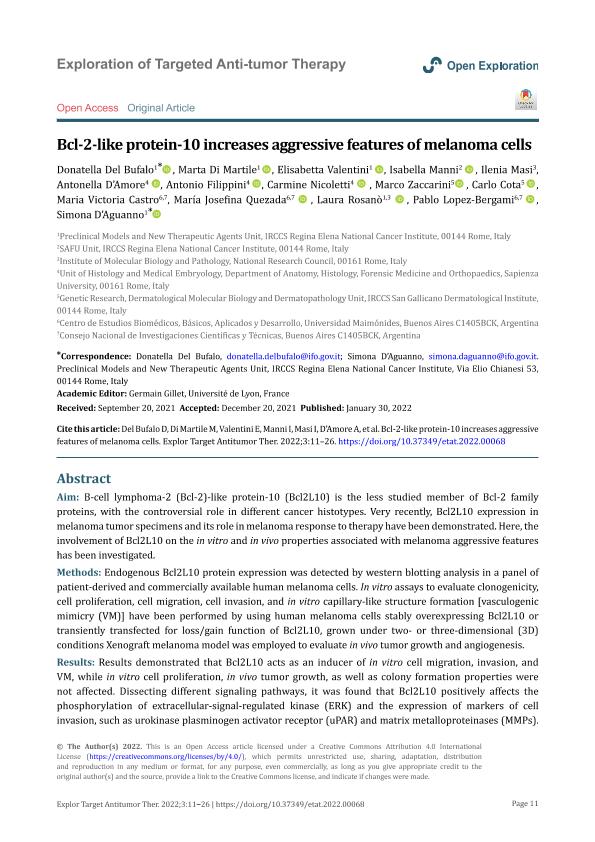Artículo
Bcl-2-like protein-10 increases aggressive features of melanoma cells
Del Bufalo, Donatella; Di Martile, Marta; Valentini, Elisabetta; Manni, Isabella; Masi, Ilenia; D'Amore, Antonella; Filippini, Antonio; Nicoletti, Carmine; Zaccarini, Marco; Cota, Carlo; Castro, María Victoria ; Quezada, Maria Josefina
; Quezada, Maria Josefina ; Rosanò, Laura; Lopez Bergami, Pablo Roberto
; Rosanò, Laura; Lopez Bergami, Pablo Roberto ; D'Aguanno, Simona
; D'Aguanno, Simona
 ; Quezada, Maria Josefina
; Quezada, Maria Josefina ; Rosanò, Laura; Lopez Bergami, Pablo Roberto
; Rosanò, Laura; Lopez Bergami, Pablo Roberto ; D'Aguanno, Simona
; D'Aguanno, Simona
Fecha de publicación:
01/2022
Editorial:
Open Exploration
Revista:
Exploration of Targeted Anti-tumor Therapy
e-ISSN:
2692-3114
Idioma:
Inglés
Tipo de recurso:
Artículo publicado
Clasificación temática:
Resumen
Aim: B-cell lymphoma-2 (Bcl-2)-like protein-10 (Bcl2L10) is the less studied member of Bcl-2 family proteins, with the controversial role in different cancer histotypes. Very recently, Bcl2L10 expression in melanoma tumor specimens and its role in melanoma response to therapy have been demonstrated. Here, the involvement of Bcl2L10 on the in vitro and in vivo properties associated with melanoma aggressive features has been investigated. Methods: Endogenous Bcl2L10 protein expression was detected by western blotting analysis in a panel of patient-derived and commercially available human melanoma cells. In vitro assays to evaluate clonogenicity, cell proliferation, cell migration, cell invasion, and in vitro capillary-like structure formation [vasculogenic mimicry (VM)] have been performed by using human melanoma cells stably overexpressing Bcl2L10 or transiently transfected for loss/gain function of Bcl2L10, grown under two- or three-dimensional (3D) conditions Xenograft melanoma model was employed to evaluate in vivo tumor growth and angiogenesis. Results: Results demonstrated that Bcl2L10 acts as an inducer of in vitro cell migration, invasion, and VM, while in vitro cell proliferation, in vivo tumor growth, as well as colony formation properties were not affected. Dissecting different signaling pathways, it was found that Bcl2L10 positively affects the phosphorylation of extracellular-signal-regulated kinase (ERK) and the expression of markers of cell invasion, such as urokinase plasminogen activator receptor (uPAR) and matrix metalloproteinases (MMPs). Of note, Bcl2L10-dependent in vitro migration, invasion, and VM are linked to uPAR. Bcl2L10 also negatively regulates the intracellular calcium level. Finally, reduced invasion capability in 3D spheroid invasion assay of melanoma cells transiently overexpressing Bcl2L10 was observed after treatment with inhibitors of MMPs and uPAR. Conclusions: Overall, data reported in this paper provide evidence supporting a positive role of Bcl2L10 in melanoma aggressive features.
Archivos asociados
Licencia
Identificadores
Colecciones
Articulos(SEDE CENTRAL)
Articulos de SEDE CENTRAL
Articulos de SEDE CENTRAL
Citación
Del Bufalo, Donatella; Di Martile, Marta; Valentini, Elisabetta; Manni, Isabella; Masi, Ilenia; et al.; Bcl-2-like protein-10 increases aggressive features of melanoma cells; Open Exploration; Exploration of Targeted Anti-tumor Therapy; 3; 1-2022; 11-26
Compartir
Altmétricas



